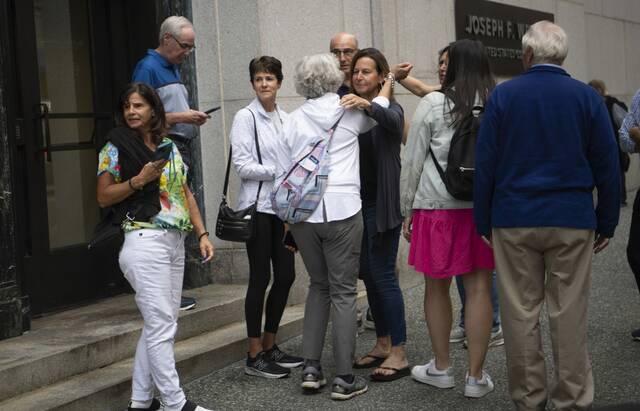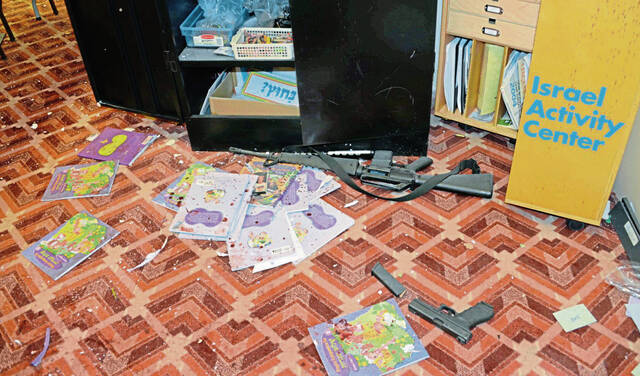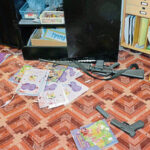The jury considering the fate of the man who killed 11 people at a Squirrel Hill synagogue nearly five years ago will continue their deliberations on Wednesday.
The panel of seven women and five men began discussing the penalty-phase verdict for Robert Bowers at 9 a.m. Tuesday and broke for the day around 4:30 p.m.
They are tasked with deciding whether Bowers, 50, of Baldwin will receive the death penalty or life in prison with no chance for release.
A verdict for death must be unanimous. Anything less than that defaults to a life sentence.
The jury found Bowers guilty of all 63 counts against him on June 16. The case then moved into the eligibility phase where the jury found Bowers had the requisite intent to kill, making him eligible for capital punishment.
The jury deliberated less than two hours in that phase before finding Bowers could be considered for the death penalty.
Government prosecutors said that is the only fitting penalty given the circumstances of the crime. Bowers killed 11 people, eight of them considered to be vulnerable victims based on their age or disability, because of religious hatred.
Those killed in the attack were Rose Mallinger, 97; Bernice Simon, 84, and her husband, Sylvan Simon, 86; brothers David Rosenthal, 54, and Cecil Rosenthal, 59; Dan Stein, 71; Irving Younger, 69; Dr. Jerry Rabinowitz, 66; Joyce Fienberg, 75; Melvin Wax, 87; and Richard Gottfried, 65.
They were members of the Tree of Life-Or L’Simcha, Dor Hadash and New Light congregations, which worshiped at the Tree of Life synagogue at the time of the attack.
Just 30 minutes into their deliberations Tuesday, jurors asked U.S. District Judge Robert J. Colville if they could view the weapons in evidence.
Both the prosecution and defense agreed they could, and the judge asked the jurors to return to the courtroom. There, they were permitted to look at — but not touch — the three Glock handguns and AR-15 rifle used in the Oct. 27, 2018, attack. Also displayed were a shotgun taken from the suspect’s car and a rifle used that day by a responding Pittsburgh SWAT officer.
The weapons, still inside their evidence boxes, were displayed on a table set up in front of the jury box. Most of the jurors walked around the table and stopped at one of the long guns, spending a few minutes looking at it and gesturing.
Several of the jurors spoke to each other, and then they started asking questions of one of the U.S. marshals on hand to observe.
The defense objected and, after the jury left the room, requested that the marshal explain what they spoke about.
Marshal Joseph Klaus was sworn in and said the first question he was asked was where the handguns were carried.
“I told them I did not know,” he told the court.
Then, Klaus said he was asked how to load a shotgun.
“I answered from the bottom and the side,” he said.
Then, a juror asked, “ ‘Is that the magazine for the AR?’ I said yes.”
Those conversations prompted a request for a mistrial by the defense, which argued the marshal should not have spoken to the jurors at all.
While the conversations were not malicious, defense attorney Elisa Long said Klaus should not have been commenting on the evidence.
“That’s for the jury to make, not for the marshal to interject,” she said.
Assistant U.S. Attorney Soo Song said a mistrial was not necessary, and a cautionary instruction to the jury would be adequate.
The judge agreed, denying the request. He brought the jury back in and addressed them.
“You should disregard completely anything said to you and overheard between any questions between jurors and the marshals,” Colville said. “It’s not evidence, and you should completely disregard those communications.”
Shortly after noon, the jury requested to see two defense exhibits that included records from Bowers’ hospitalization in 1985 at Southwood Psychiatric Hospital.
The judge sent an answer back telling the jurors that the exhibits were part of the binders of exhibits they already had with them.
There were no additional questions for the rest of the day.











